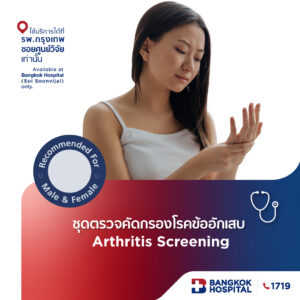Currently, most people place more importance on exercising, and many may experience joint pain during exercise or playing sports that involve a lot of jumping or running for an extended period. They might also feel joint pain when the weather gets colder. Individuals of this type are highly likely to be categorized in the at-risk group for arthritis. Arthritis is the general name for this group of diseases, which can be divided into more than 200 types. The two most common types are osteoarthritis or chronic arthritis (Osteoarthritis) and Rheumatoid Arthritis (The Rheumatoid Arthritis). Both types have different causes: Osteoarthritis results from the deterioration of the cartilage that covers the bone joints gradually disappearing, causing bone joints to rub against each other during movement, leading to stiffness and resulting in pain, especially in cold weather. The exact cause of Rheumatoid Arthritis is unknown, but it is often caused by an abnormal immune system response, damaging one’s own joints. This disease can occur at any age, especially between the ages of 22 – 55, and women are three times more likely to develop the disease than men. It is also a chronic disease with symptoms that come and go. However, some patients could develop the condition as well. Those likely to develop arthritis are mostly overweight people or even athletes who are otherwise healthy. Athletes, runners, high jumpers are all in the risk group because they need to use various joints, especially the knees and ankles, in running or jumping, leading to pressure on the bone joints, similar to people who are overweight. The suitable diet for patients with this disease is mostly recommended to be similar to those controlling weight, which emphasizes low-fat food and mainly consuming fruits and vegetables, as overweight individuals or those suffering from arthritis are advised to try to control their weight alongside medication treatment by focusing on consuming whole grains that are less refined, such as brown rice, unbleached flour, and various green leafy vegetables that are sources of beta-carotene, calcium, folate, iron, Vitamin C should be consumed daily, even in small amounts but consistently. Apart from various weight-controlling foods, patients should also consume fish that contain fish oil, as evidence shows that omega-3 fatty acids found in unsaturated fats in fish have properties that inhibit bone joint inflammation. Therefore, it is recommended to consume an average of 2 – 3 times per week, or it may be consumed in the form of fish oil capsules, but it should be taken according to the instructions on the label and not exceed the prescribed amount. Besides fish oil, evening primrose oil also has properties that can help reduce inflammation. Before taking it, consult a doctor to see if it is suitable. As for the foods that should be regularly considered, they are
- Fish high in omega-3 fatty acids such as salmon, sardines, mackerel, tuna, catfish, and snakehead, especially for those with rheumatoid arthritis
- Less refined grains such as brown rice, wholewheat bread, wholewheat kernels, and various beans, but beans should not be consumed in large quantities as they are high in calories
- Fruits and vegetables such as different green vegetables, bananas as a source of potassium, and fiber should be consumed at least 3 times a week. Even ginger, which has been found to contain substances that can help reduce inflammation. Therefore, it should be consumed at least 5 grams, twice a week, including leeks, pears, or celery, which have the same properties, especially for patients with osteoarthritis
Patients with rheumatoid arthritis should consume soybeans and soy products, such as tofu from soy milk, for example. As for foods that should be completely avoided or consumed in small amounts, these include foods that have been refined until white, and foods that are very salty or very sweet. Reduce foods that contain saturated fatty acids, such as butter, hard cheese, coconut oil.








